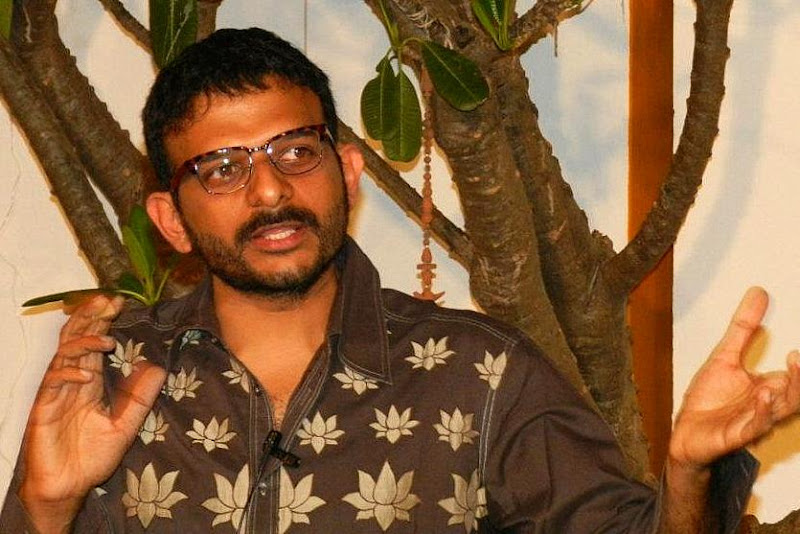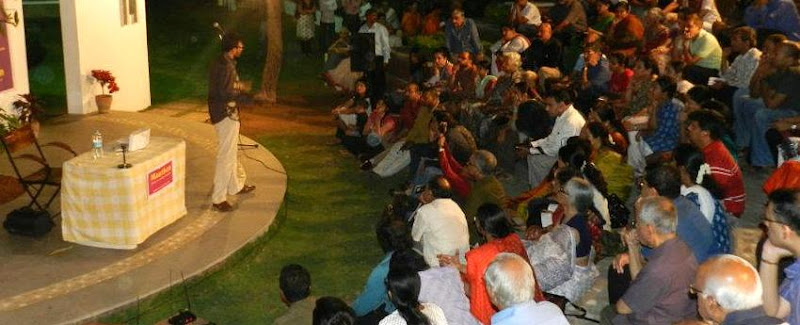 | |
| TM Krishna speaking at Saptaparni, Hyderabad | |
The evening in Hyderabad magically turned cool, crisp and windy, ensuring that we got to enjoy this perfect summer evening in a magnificent ambiance.
There are many articulate Indian musicians, but very few who can hold your attention in quite the way T M Krishna can—if you catch him, as Manthan in Hyderabad a few days back, at his expansive best. He dazzled us by asking questions, nudging out answers, moving fluidly and expressing his opinions lucidly.
It was an evening when Manthan hosted an interactive session with the musician T M Krishna where he offered his perspective on 'Who does the musician sing for?' in a Baithak of a select few discerning audience.
Very articulate and clear in his mind about his own priorities as a classical singer and what he wants in his musical life, he organized and set the tone for the evening by posing and then fielding a series of thought provoking questions often eliciting the answers from the interactive audience themselves. As he impishly declared, his job was to ask questions more than providing the answers. Manthan’s intellectually soaked audience offered answers with different hues.
Revealing that he comes from a family of businessmen and was the only professional musician in the family, he first broke the myth of many people who consider Carnatic music as having lasted thousands of years, by pointing out that the genre of music evolved much more recently, over the last few hundred years only, crystallizing into its current grammar and form, as recently as during and after the generation of the Trinity of Carnatic music Shyama Shastri, Tyagaraja and Muthuswami Dikshitar in the eighteenth century. He asked almost rhetorically what the audience considers a good concert, a 'paisa vasool' one; and he then flipped the question over by asking what the audience doesn't like in a concert, leading the audience to confess that the musician is in essence seen as a service provider, merely operating at the supply end of the demand curve and existing to please the audience. He expressed some reservation, personally speaking, of the tendency of people who view a concert as one would, a movie and judging it in terms of gratification and return on investment revealing that his own style was to decide what to give rather than what the audience wishes thereby setting the benchmark on himself.

With deft analogies and questions, he skillfully constructed an argument where he expressed that music exists as a shining entity and hoped that both the audience and the musician draw from it in a spirit of partnership enhancing the experience. His take was that if an artist starts worrying too much about accolades and his crowd pulling ability then his performance would suffer. He revealed that getting accolades and ‘Bale Bale’ from the audience was indeed very easy for a performer. He even bet that he could arrange a concert where he could, if he so wished, programme the audience to cheer and applaud at certain times, that he would have decided beforehand by employing techniques of swaying the crowd, but he would rather not do it. And he questioned the judgment of those who do so.
He also expounded on what a Rasa in a concert meant, what aesthetics meant. When he found the audience dwelling on the religious interpretation of Bhakthi, he revealed that his own take on bhakthi differed and that he finds the syllabic arrangement of a composition as aesthetic.
He gently admonished the audience who are used to playing ‘guess the raaga’ games. He urged them to let the ragas be, and concentrate more on enjoying the music rather than be consumed by identifying the ragas.
In a trait rare in Indian classical intellectuals, TMK offers scenarios, and shapes an argument regaling you with anecdotes that are never malicious, but infused, rather, with gentle delight in the ironies of music itself. Given the grand sweep of his arguments, his attention to detail was almost disconcerting.
It is possible that T M Krishna, if allowed to have his way over time, could chart a whole new way of experiencing this traditional art form of Carnatic Music in the coming days giving it a newer nuance and feel.

